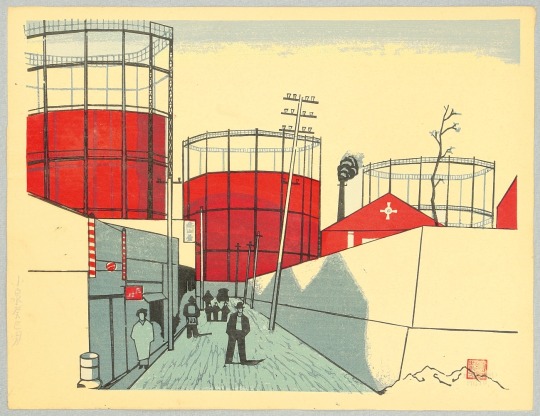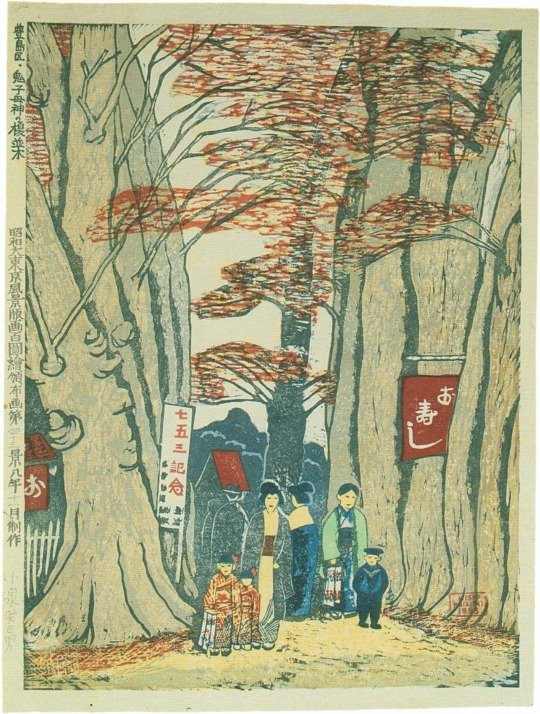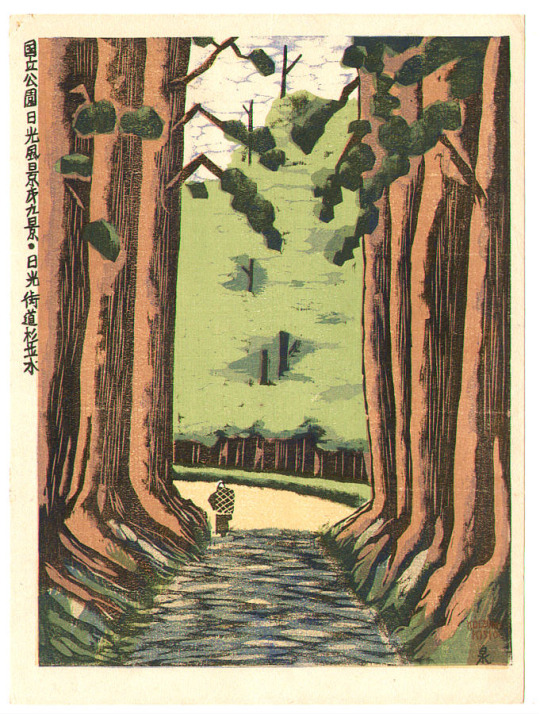#koizumi kishio
Explore tagged Tumblr posts
Text

Koizumi Kishio
Senju Town with Storage Tanks
1929
#koizumi kishio#japanese art#japanese woodblock#woodblock art#woodblock print#woodcut#japanese artist#japanese prints#1920s art#Japan#modern art#senju#cityscape#showa era#showa print#1920s japan#architectural#storage tanks#senju town#1920s architecture#japanese architecture#street scene
162 notes
·
View notes
Text

Koizumi Kishio, Camellias, 1930
76 notes
·
View notes
Text

Kishio Koizumi (1893-1945) One Hundred Pictures of Great Tokyo: Togoshi Ginza Station
小泉癸巳男 「昭和大東京百図絵版画完制判 第二十七景 戸越銀座駅(荏原区)」
88 notes
·
View notes
Photo

"Yamashita Entrance to Ueno Park (#17)," by Kishio Koizumi, dated September 1931. Part of his "One Hundred Pictures of Great Tokyo During the Showa Period" series. It shows a moga entering Ueno Park, the biggest park in Tokyo. Text by Matthew Legare
94 notes
·
View notes
Quote
Eyes fixed on the hands of the wall clock, Junpei thought about the rest of the story for Sala—the tale of Masakichi and Tonkichi. He had to find a way out. He couldn't just leave Tonkichi stranded in the zoo. He had to save him. He retraced the story from the beginning. Before long, the vague outline of an idea began to sprout in his head, and, little by little, it took shape.
honey pie, from after the quake by Haruki Murakami

Art by Kishio Koizumi
8 notes
·
View notes
Text
20241110 Japan Art and Koizumi Kishio: Tokyo in the 1930s
Japan Art and Koizumi Kishio: Tokyo in the 1930s Lee Jay Walker Modern Tokyo Times Koizumi Kishio (1893-1945) was born during the dynamic Meiji Period (1868-1912). However, he witnessed the nationalist period of the early Showa Period and the devastation of the Pacific War. Indeed, the carpet bombing of Tokyo by America entailed that he was forced to […] Japan Art and Koizumi Kishio: Tokyo in…

View On WordPress
0 notes
Text



001. Chasing Modernity, Sept 1928
This artwork is the work of two late printmakers, Oda Kazuma (1881-1956 ) and Kishio Koizumi ( 1893-1945), both of whom were members of the Sosaku Hanga ( creative print) movement who had a common goal of depicting daily life in Japan after the 1923 earthquake. Oda Kazuma and Koizumi produced self-carved and professional woodblock prints and were highly dedicated to their work.
After sifting through their collection, these were my favorite. I love the excellent tone color palate in contrast to heavy, warmer tones and how they skillfully use texture. The waterfall piece is an excellent texture exhibit; I am so in love with how effortlessly their color palettes work together to tell a story. Speaking of story, I love the idea of every piece being so mundane in nature. Most of their artwork is from the everyday lives of people in Japan, and I enjoy how thoughtfully they both portray these lives. With all the automobiles moving throughout the city scene, "Twilight at Ginza," I love the block texture that makes it look like it's snowing and the soft and subtle contrast of yellow and white to emulate light. The last one is called The Great Bridge in Matsue, and I adore how the mountainscape background is completely white and greyed out. I love seeing just how well the colors pop on the page, and it inspires me to experiment with the idea of "less is more.” I always find myself trying to add more and more when I can focus on the color or texture and simplicity instead.
0 notes
Text



001. Chasing Modernity, Sept 1928
This artwork is the work of two late printmakers, Oda Kazuma (1881-1956 ) and Kishio Koizumi ( 1893-1945), both of whom were members of the Sosaku Hanga ( creative print) movement who had a common goal of depicting daily life in Japan after the 1923 earthquake. Oda Kazuma and Koizumi produced self-carved and professional woodblock prints and were highly dedicated to their work.
After sifting through their collection, these were my favorite. I love the excellent tone color palate in contrast to heavy, warmer tones and how they skillfully use texture. The waterfall piece is an excellent texture exhibit; I am so in love with how effortlessly their color palettes work together to tell a story. Speaking of story, I love the idea of every piece being so mundane in nature. Most of their artwork is from the everyday lives of people in Japan, and I enjoy how thoughtfully they both portray these lives. With all the automobiles moving throughout the city scene, "Twilight at Ginza," I love the block texture that makes it look like it's snowing and the soft and subtle contrast of yellow and white to emulate light. The last one is called The Great Bridge in Matsue, and I adore how the mountainscape background is completely white and greyed out. I love seeing just how well the colors pop on the page, and it inspires me to experiment with the idea of "less is more.” I always find myself trying to add more and more when I can focus on the color or texture and simplicity instead.
0 notes
Photo

View of Ginza in the Spring - Koizumi Kishio, 1931.
Japanese, 1893-1945
Woodblock , 11 7/8 x 15 1/2 in.
689 notes
·
View notes
Photo

“Hackberry Tree-Lined Road at Kishimojin Shrine at Toshima Ward (Zōshigaya), November 1933″ by Koizumi Kishio (小泉癸巳男) (1893-1945), showing families on their way to Tokyo’s famous shrine dedicated to Kishimojin (鬼子母神), the goddess of child protection, during November’s Shichi-Go-San Festival (七五三), an especially appropriate venue as it were
Image from “Tokyo: The Imperial Capital: Woodblock Prints by Koizumi Kishio, 1928-1940″ edited by Leslie Sternlieb, Nancy TenBroeck, and Akiko Ito Hocsman, published by The Wolfsonian, Florida State University, 2003, page 66
#japanese art#japanese prints#小泉癸巳男#koizumi kishio#東京#tokyo#豊島区#toshima ward#雑司が谷#雑司ヶ谷#zoshigaya#鬼子母神堂#kishimojindo#七五三#shichigosan#crazyfoxarchives
24 notes
·
View notes
Text

Koizumi Kishio
Japanese Cedar Trees National Parks Nikko
1931
#koizumi kishio#japanese woodblock#woodblock art#woodblock print#japanese prints#japanese artist#japanese art#japan#print making#Japanese cedar trees#cedar#trees and forests#national park#japanese#1930s vintage#1930s style#1930s
98 notes
·
View notes
Text

Koizumi Kishio, Shiba Park, Pagoda and Plum Trees, 1931
29 notes
·
View notes
Text

Kishio Koizumi 1893-1945 One Hundred Pictures of Great Tokyo in the Showa Era: Streetscape at Shinjuku
小泉癸巳男『昭和大東京百図絵版画』より《第六十一景・淀橋区新宿街景》(昭和10年4月作)。新宿通りの三越の屋上にアドバルーン。新宿三越は昭和5年10月にこの地に新築移転、斜め向かいの伊勢丹は昭和8年9月に新築開店。青の色彩が美しい。
29 notes
·
View notes
Text








Nihon No Hanga Gallery, Amsterdam
3 notes
·
View notes
Text










100 Pictures of Great Tokyo in the Showa Era
Koizumi Kishio
#art#painting#printmaker#print#print art#prints#japan#japanese#japanese painting#koizumi kishio#tokyo
3 notes
·
View notes
